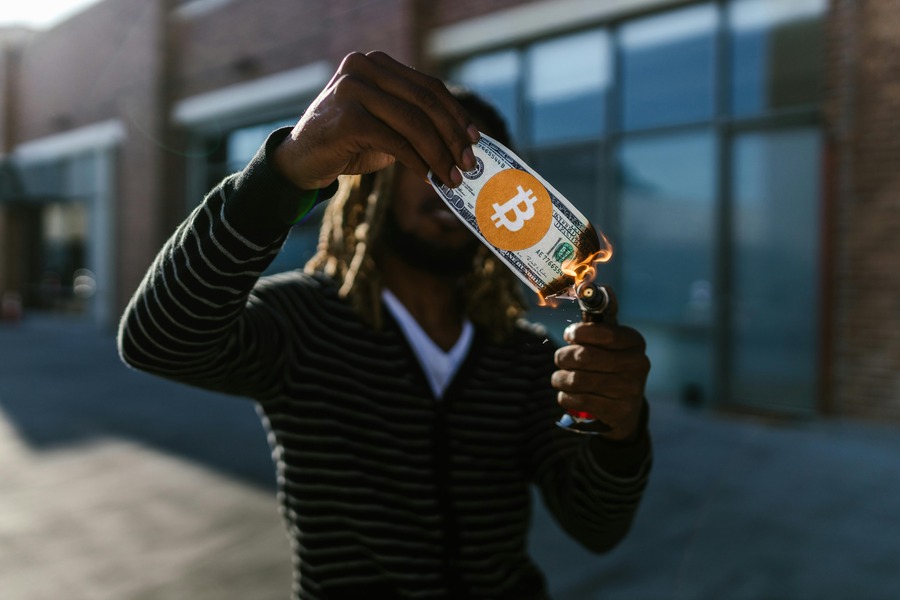What is Bitcoin? A Beginner’s Guide
- 30 Aug 2024
- Crypto OG's mentioned:

Bitcoin is the world’s first cryptocurrency, a decentralized digital currency that allows peer-to-peer transactions over the internet. Since its inception in 2009, Bitcoin has grown from an obscure technology experiment into a global financial phenomenon, often referred to as "digital gold."
The Origins of Bitcoin
Bitcoin was created by an anonymous individual or group of individuals under the pseudonym Satoshi Nakamoto. In October 2008, Nakamoto published the Bitcoin whitepaper titled "Bitcoin: A Peer-to-Peer Electronic Cash System," which outlined the principles of a decentralized digital currency that would operate without the need for a central authority, such as a government or financial institution. The first Bitcoin block, known as the "genesis block," was mined on January 3, 2009, marking the launch of the Bitcoin network. Embedded in the genesis block was the following message:
"The Times 03/Jan/2009 Chancellor on brink of second bailout for banks."
This highlighted Bitcoin's roots as a response to the global financial crisis of 2008 and underscored its vision of a decentralized and transparent financial system.
Bitcoin’s pseudonymous creator disappeared from public view in 2010, leaving a thriving open-source community to continue its development.

How Does Bitcoin Work?
Bitcoin operates on a decentralized network of computers (nodes) that collectively maintain a shared ledger called the blockchain. The blockchain is a chain of blocks, each containing a list of transactions. Here’s how it works:
1. Blockchain Technology
The blockchain is the backbone of Bitcoin. It’s a distributed ledger that records all Bitcoin transactions across a network of computers. Each block in the chain contains:
- A list of transactions.
- A timestamp for each transaction.
- A reference (hash) to the previous block.
This design ensures that no transaction can be altered retroactively without affecting all subsequent blocks, making the blockchain virtually tamper-proof.
2. Mining and Proof of Work
Bitcoin transactions are verified through a process called mining. Miners use powerful computers to solve complex cryptographic puzzles that validate and secure transactions. Once a puzzle is solved, a new block is added to the blockchain.
Miners are rewarded with newly created bitcoins and transaction fees, incentivizing them to maintain the network. This system is called Proof of Work (PoW).
3. Decentralization
Unlike traditional currencies issued by central banks, Bitcoin is decentralized. This means no single entity—be it a government or a corporation—controls the Bitcoin network. Instead, the network is maintained by a global community of users and miners, ensuring transparency and resilience.
4. Fixed Supply
Bitcoin’s limited supply is one of its defining features. Only 21 million bitcoins will ever exist. This scarcity is built into Bitcoin’s code, making it a deflationary asset and a potential hedge against inflation. Its fixed supply contrasts sharply with fiat currencies, which can be printed at will by central banks.

Why is Bitcoin Important?
Bitcoin has been described as a revolutionary technology with the potential to transform the global financial system. Here’s why it’s considered significant:
1. Store of Value
Bitcoin is often referred to as "digital gold." Like gold, it is finite in supply and cannot be easily created or destroyed. This makes Bitcoin an attractive asset for individuals and institutions looking to preserve wealth in uncertain economic times.
2. Financial Sovereignty
Bitcoin gives users full control over their money. By eliminating intermediaries like banks, Bitcoin enables people to manage their finances directly, reducing reliance on centralized institutions.
3. Borderless Transactions
Bitcoin transcends borders, allowing anyone with an internet connection to send and receive money globally. Its decentralized nature eliminates the need for intermediaries like banks or remittance companies, making cross-border payments faster, cheaper, and more accessible. This has significant implications for:
-
Remittances: Bitcoin reduces the high fees often associated with traditional remittance services, such as Western Union or MoneyGram. For example, migrant workers can send funds directly to their families in developing countries without incurring hefty charges. This is especially beneficial in regions like sub-Saharan Africa, where remittance fees can average 8-10% of the transaction amount.
-
Financial Inclusion: Bitcoin provides financial services to the unbanked population, estimated at over 1.4 billion people globally. In regions with limited access to traditional banking, such as parts of Africa, Southeast Asia, and Latin America, Bitcoin acts as a gateway to savings, payments, and investments.
-
Aid and Donations: Bitcoin enables seamless, transparent, and direct aid transfers to people in crisis zones. Non-profits and charitable organizations like The Water Project and Save the Children accept Bitcoin donations, ensuring that funds reach recipients without being siphoned off by intermediaries.
-
International Trade: For businesses, Bitcoin simplifies cross-border trade by eliminating the need for currency conversions. Companies can transact in Bitcoin without worrying about exchange rate fluctuations or delays in traditional banking systems.
-
Travel and Tourism: Travelers can use Bitcoin to pay for accommodations, flights, and activities worldwide. Platforms like Travala allow users to book hotels and flights using Bitcoin, making international travel more seamless.
-
Global Freelancing: Bitcoin has become popular among freelancers and remote workers who collaborate with international clients. Platforms like Bitwage let workers receive part or all of their salaries in Bitcoin, bypassing slow and costly international bank transfers.
4. Hedge Against Inflation
In countries experiencing hyperinflation, Bitcoin has emerged as a viable alternative to rapidly depreciating fiat currencies. For example, in Venezuela, where hyperinflation reached over 65,000% in 2018, citizens have turned to Bitcoin to protect their savings and maintain purchasing power. Similarly, in Argentina, with annual inflation rates exceeding 100% in recent years, Bitcoin is increasingly used as a hedge against the devaluation of the Argentine peso.
Bitcoin’s fixed supply of 21 million coins and deflationary nature make it an attractive store of value. Unlike fiat currencies that can be printed at will by central banks, Bitcoin’s scarcity ensures that it cannot be devalued through monetary policy.
Other countries where Bitcoin adoption has risen in response to inflation include:
- Turkey: Faced with a rapidly declining lira, Turkish citizens have adopted Bitcoin to preserve wealth and avoid the erosion of their savings.
- Lebanon: With banking restrictions and a collapsing currency, Lebanese citizens use Bitcoin as a lifeline for financial stability.
- Nigeria: Amid rising inflation and currency instability, Nigerians have embraced Bitcoin as both a store of value and a medium for remittances.
Bitcoin also provides a hedge for individuals in relatively stable economies, as it offers diversification and a safeguard against unforeseen economic downturns or currency depreciation.
5. Censorship Resistance
Bitcoin transactions cannot be censored, blocked, or reversed by governments, banks, or financial institutions. This decentralized nature makes it a powerful tool for financial freedom, particularly in regions with authoritarian regimes or restrictive financial systems.
In countries with oppressive governments, such as North Korea or Myanmar, access to traditional financial services may be limited or monitored. Bitcoin enables individuals to bypass these restrictions, giving them the ability to save and transact freely without fear of interference.
Examples of Bitcoin’s censorship resistance in action include:
- Hong Kong Protests (2019): During the pro-democracy protests, activists turned to Bitcoin to raise funds and bypass banking systems that were under surveillance by the government.
- Belarus (2020): Protesters and opposition groups used Bitcoin to fund resistance movements during the political turmoil surrounding the controversial presidential election.
- Russia-Ukraine Conflict (2022): Ukrainian citizens and non-profits used Bitcoin to receive international donations, bypassing disruptions in traditional financial systems caused by the war.
Bitcoin’s censorship resistance also benefits businesses and organizations in politically sensitive regions. For instance, non-profits operating in sanctioned countries like Iran or Cuba can use Bitcoin to receive funds and bypass international banking restrictions.
Moreover, individuals living under capital controls—where governments limit the amount of money that can leave a country—can use Bitcoin to transfer wealth abroad without needing government approval.
Bitcoin’s ability to provide an uncensorable means of transacting makes it a vital tool for preserving financial independence and supporting freedom of expression globally.

How to Get Started with Bitcoin
1. Educate Yourself
Understanding Bitcoin is crucial before investing or using it. Start by reading Satoshi Nakamoto’s whitepaper, titled "Bitcoin: A Peer-to-Peer Electronic Cash System." This foundational document outlines the principles behind Bitcoin, including its decentralized nature, the blockchain, and the concept of Proof of Work (PoW).
In addition to the whitepaper, explore resources like Crypto for Beginners: A Complete Guide, which provides an in-depth overview of cryptocurrency basics, wallet setup, and safety tips. Learn about Bitcoin’s potential benefits, such as its use as a store of value and a hedge against inflation, as well as risks like volatility, security concerns, and regulatory uncertainties.
To deepen your understanding:
- Watch educational videos on platforms like YouTube from credible crypto educators.
- Follow trusted Bitcoin communities and forums, such as r/Bitcoin on Reddit, to stay updated and engage in discussions.
- Read books like "The Bitcoin Standard" by Saifedean Ammous for historical and economic perspectives on Bitcoin’s role in the global financial system.
By investing time in education, you’ll gain the knowledge and confidence to navigate the world of Bitcoin responsibly and make informed decisions.
2. Choose a Wallet
Bitcoin wallets come in two main types:
- Hot Wallets: Online wallets like Exodus or Trust Wallet offer convenience but are less secure.
- Cold Wallets: Hardware wallets like Ledger provide enhanced security for long-term storage.
For tips on securely storing your Bitcoin, check out our guide, How to Safely Store Your Cryptocurrency.
3. Buy Bitcoin
To buy Bitcoin, you’ll need to use a cryptocurrency exchange. Some popular options include Coinbase, Binance, and Kraken. If you’re new, our List with Exchanges can help you choose the best platform.
4. Secure Your Bitcoin
Protecting your Bitcoin is essential. Use strong passwords, enable two-factor authentication, and never share your private keys. For large holdings, consider a hardware wallet.

The Future of Bitcoin
Bitcoin’s future is both promising and uncertain. Key factors influencing its trajectory include:
1. Increased Institutional Adoption
Major companies like Tesla, MicroStrategy, and Square have invested billions of dollars into Bitcoin, using it as a reserve asset to hedge against inflation and currency devaluation. MicroStrategy, in particular, has led the way, holding over 150,000 bitcoins as of 2024, demonstrating long-term confidence in Bitcoin's value.
In addition to these companies, asset management firms like BlackRock and Fidelity have started offering Bitcoin-related investment products, signaling growing institutional acceptance. El Salvador has even adopted Bitcoin as legal tender, showcasing the potential for governments to embrace cryptocurrency as part of their monetary systems.
Institutional adoption isn’t limited to holding Bitcoin; companies like PayPal and Visa have integrated Bitcoin payments, allowing millions of merchants and users to transact seamlessly. This increased adoption boosts Bitcoin’s legitimacy, stabilizes its price, and drives demand across global markets.
2. Integration with Global Finance
Bitcoin’s integration with traditional financial systems has made it more accessible to a broader audience. Bitcoin Exchange-Traded Funds (ETFs), such as those launched by ProShares and Valkyrie, allow investors to gain exposure to Bitcoin without directly owning the cryptocurrency. These ETFs make it easier for traditional investors, such as retirement funds and hedge funds, to include Bitcoin in their portfolios.
Additionally, platforms like Bakkt and CME Group offer Bitcoin futures and options contracts, providing sophisticated tools for hedging and speculative trading. The increasing adoption of Bitcoin-backed loans by companies like BlockFi further bridges the gap between traditional finance and cryptocurrency, allowing individuals and businesses to leverage their Bitcoin holdings for liquidity.
Bitcoin is also finding its way into cross-border payment systems. SWIFT, traditionally used for international bank transfers, is exploring blockchain technology to streamline settlement processes, showcasing Bitcoin’s indirect influence on financial innovation.
3. Technological Developments
Bitcoin’s scalability and energy consumption remain critical challenges, but ongoing technological advancements aim to address these issues. The Lightning Network, a second-layer solution built on top of Bitcoin, allows for instant and low-cost transactions. It’s particularly useful for microtransactions, enabling Bitcoin to be used for everyday purchases like coffee or online subscriptions. Platforms like Strike leverage the Lightning Network to facilitate remittances and global payments.
Efforts to improve Bitcoin’s environmental impact are also underway. Miners are increasingly adopting renewable energy sources, such as solar, hydro, and wind power, to reduce the carbon footprint associated with Bitcoin mining. For example, countries like Iceland and Norway use geothermal energy for mining operations, setting a precedent for sustainable practices.
Moreover, the adoption of Taproot, a significant upgrade to the Bitcoin protocol, enhances privacy and efficiency by reducing transaction data size. This upgrade also paves the way for more advanced smart contract functionality, potentially expanding Bitcoin’s use cases in decentralized finance (DeFi) and other applications.
Innovative solutions like sidechains, including Rootstock (RSK), aim to add programmability to Bitcoin without altering its core architecture. These technologies enhance Bitcoin’s utility while preserving its security and decentralization.
4. Regulation
Governments worldwide are working to regulate Bitcoin. Clear regulations, like those in Japan and Switzerland, can foster adoption by legitimizing the market. However, restrictive measures, such as China’s ban on Bitcoin mining, have pushed miners to relocate to jurisdictions with friendlier policies, like the United States.
Emerging frameworks like the EU’s MiCA regulations aim to balance innovation with consumer protection. While regulatory clarity can attract institutional investors, overly stringent rules risk stifling growth. Learn more about the environmental impact of Bitcoin in our post, Can Crypto Go Green? The Environmental Impact.
5. Competition from Other Cryptocurrencies
Bitcoin faces growing competition from cryptocurrencies like Ethereum, Solana, and Cardano, which offer advanced features like smart contracts and faster transactions. For example, Ethereum’s PoS upgrade has reduced its energy consumption significantly, making it a popular choice for DeFi and NFTs. Solana stands out for its speed and low costs, while Cardano focuses on energy efficiency and research-backed development.
Despite these challenges, Bitcoin’s first-mover advantage, unmatched decentralization, and reputation as "digital gold" secure its position as a leading cryptocurrency. While altcoins cater to specific applications, Bitcoin remains a preferred store of value and hedge against inflation.
Conclusion
Bitcoin is more than just a digital currency—it’s a revolutionary technology reshaping the financial system. With its decentralized nature, fixed supply, and ability to enable borderless, censorship-resistant transactions, Bitcoin empowers individuals worldwide while addressing challenges like inflation and financial inclusion.
Despite facing competition and regulatory scrutiny, Bitcoin’s first-mover advantage, strong community, and ongoing innovation secure its role as a cornerstone of the cryptocurrency ecosystem. Whether you’re a beginner or seasoned investor, understanding Bitcoin is a vital step in exploring the future of decentralized finance and digital money.








